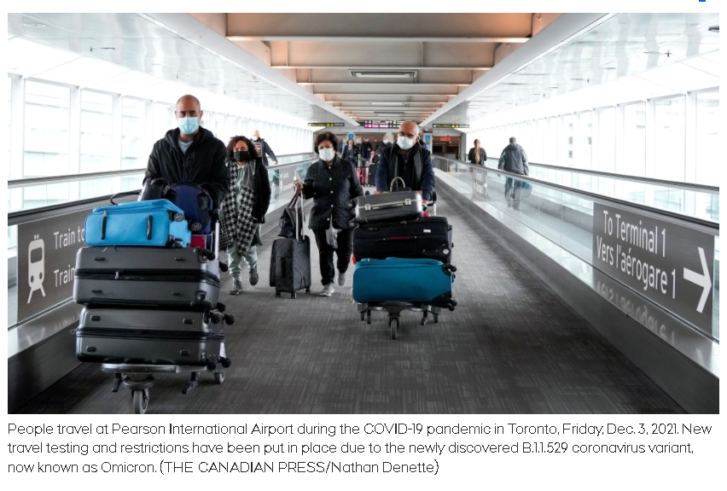TORONTO — Experts are divided on whether travel is advisable in light of the Omicron variant spurring restrictions at the border and new travel bans leading into the holiday season.
On Tuesday, the government announced travel bans for 10 countries and added that fully vaccinated travellers arriving by air from international destinations other than the U.S. would be required to take a PCR test upon arrival, and quarantine while awaiting the results.
Some travellers are having second thoughts amid the confusion, and Martin Firestone, president of Travel Secure Inc., told CTV News Channel that the confusion at airports over the new PCR test requirement is likely to grow.
“There’s nothing clearly stated as to how it’s going to work — are they getting it done there, are they lining up with thousands of other people, are they getting a take-home test, are they going to wait and isolate three days till test results — incredibly confusing right now, in all aspects,” he said.
“I’m seeing right now there’s many people that are making a decision to cancel their flights or cancel their trips.”

Firestone said that booking an international trip for January or February might not be the best idea.
“They maybe have to be on hold,” he said.
“I’m looking at summer 2022 as the best chance to start going to Europe and Asia and places such as that.”
So far, just how dangerous Omicron might be is unclear, making it another question in the calculus of whether travelling is advisable. Scientists are studying the variant in the hopes of pinpointing whether it causes more severe illness, but so far cases have shown largely mild symptoms, and no deaths have been connected to the variant.
However, preliminary data suggests that those who have previously had COVID-19 are at a higher risk of reinfection from Omicron than other variants.
Currently, there are 18 cases of Omicron in Canada.
Not everyone is jumping to cancellations, according to Richard Vanderlubbe, president of tripcentral.ca and a member of the board of directors for the Association of Canadian Travel Agencies (ACTA), but “new inquiries and new bookings have slowed down.”
“We were at about a 40 per cent of the 2019 level just prior to that,” he told CTVNews.ca in a phone interview. “And it was rising. So I think people are pausing and they’re trying to figure out what this means.”
Many who had planned Christmas trips are likely going to go through with them and simply plan for the added requirements at the border, he said, adding that whether to travel or not is up to where a person is going and how important it is to them to make that trip.
“I think what’s happening with government testing right now at airports is long overdue,” he said. “And we need to be able to create an environment where people are safe, that we’re vaccinated, […] the testing is available, it’s not [difficult] in terms of costs, that’s convenient and we get the results quickly.”
Firestone believes that it’ll be simplest to go to the U.S. this holiday season, if a person is set on getting away despite the added restrictions.
“Going to the U.S. right now, again, if everything’s properly done, including now the new one-day rapid test, negative test, that has to be done before you get into the U.S., that could still be plausible,” he said, adding that published health measures such as masking still need to be followed.
“But I think that’s the best bet at this point, is a U.S. holiday, possibly a sun destination holiday, although you’re going to face the large crowds coming back in, getting the negative PCR test. So it’s just nothing simple anymore, and I’m hoping that we get a bit of a holiday season and then travel eventually [can] open up again.”
IF I DO TRAVEL, SHOULD I GET INSURANCE?
Travellers worried about insurance should be aware of a couple things, Vanderlubbe said.
One is that since the blanket advisory against non-essential travel was lifted by the government in October, medical insurance policies for travel are now, in general, covering COVID-19 related medical claims, he explained.
“There was a time when the advisory was out that the insurance plans did not generally cover it,” he said. “And you had to buy separate insurance.”
When it comes to cancellation insurance, after some struggles earlier in the pandemic to get airlines to issue refunds when flights were cancelled by the airline itself, airlines are now generally covering any sort of involuntary cancellation where the airline decides not to operate the flight.
“There’s not a lot of risk now for consumers in booking something and then the government comes and, let’s say in the future slaps on a restriction on a certain destination and they cancel all the flights — you won’t lose your money,” Vanderlubbe said.
That leaves voluntary cancellation, which is when a person decides themselves that they no longer wish to fly.
“I’m looking at the arrangements and I’m looking at these things going on and maybe I’m getting cold feet and I don’t necessarily want to travel,” he explained.
Considering the shifting landscape right now, a traveller who is concerned that they may want to back out later — due to fears of COVID-19, due to falling ill themselves before the flight, or due to other unforeseen complications — may want to consider a waiver or other type of insurance that could aid them if they want to cancel a flight voluntarily.
“If you change your mind, at least you don’t lose all your money, you can rebook it as a credit,” Vanderlubbe said.
Article From: CTV news
Author: Alexandra Mae Jones

